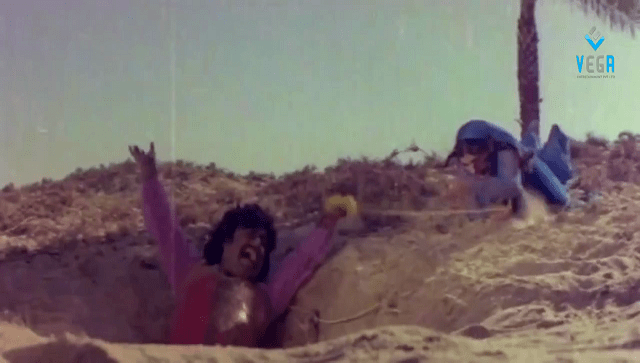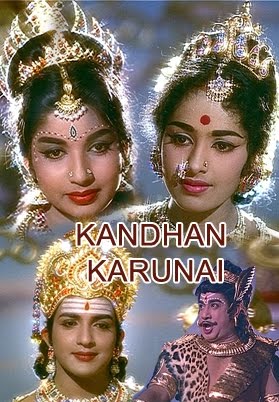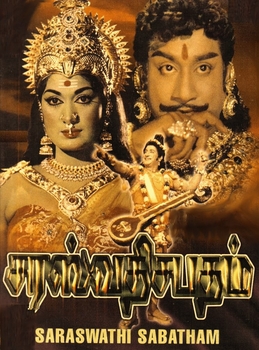There are so many great actors in Allaudinum Arputha Vilakkum. But you’d never guess they were that great just from watching it, if you catch my drift. The cast includes Kamal Haasan, Rajinikanth, Gemini Ganesan, Savitri just to name a few. I.V Sasi made his gaudy 1979 Aladdin and the Lamp film in both Malayalam and Tamil. I happened upon the Tamil version first so that is what I will be discussing here.
The story opens with a sorcerer in a cave, who reads something disturbing in his big book of spells and then uses his great powers to conjure up….dancing girls. And HELEN! He also uses his magical powder to give Helen several outfit changes. He may be evil but I think I like his priorities.
Allauddin (Kamal Haasan) is a layabout. He gets into a fight after his opponent cheats on an armwrestling challenge, and actually uses the rough end of the pineapple as a weapon! Nice. His poor mother (Savitri) looks quite done in by all the drama. He is also the only person who can retrieve the fabled lamp from a cave. The Evil Sorcerer disguises himself and persuades Allauddin to accompany him to another city. Conveniently they pass by the secret cave. Allauddin is sent in to collect a lamp and is given a magic ring that will protect him. He evades some not totally terrifying special effects – although considered cumulatively, it would have been quite enervating. I noted snakes, demons, snakes, bits of demons, snakes, dancing ladies, snakes, demons with extra bits, a lion, lake of boiling acid, snakes.
Allauddin accidentally rubs the magic ring three times, and summons the spirit who helps him get home via a leisurely flight. There is a genie in the ring and also it turns out, one in the lamp. I wonder if there is some kind of formal demarcation. They don’t seem to communicate but there must be rules, surely?
Allauddin makes a wish and his lifestyle goes from poor but honest to grand and gaudy in an instant. Seriously. His outfits are just something else. And Savitri looks a lot more like, well, Savitri when she is in her fine silks and sparkles. He makes the transition from lazy rogue to competent hero with minimal effort. And I mean minimal effort. Kamal Haasan puts no energy into the action scenes, preferring to conserve his resources for the abundant opportunities to overact. He doesn’t even dance much.
He meets the ruling family when he accidentally saves one from ambush, when all he’d meant to do was have a perv at the dancers. And that brings him into the path of Kamaruddin (Rajinikanth!!!!). Back at the court, the Shahenshah (PS Veerappa I think) rewards Allauddin for his bravery and is furious at his security people that this incursion was allowed so easily. He berates his courtiers, especially Mir Qasim (Gemini Ganesan in a fetching lilac top and gold cloche) who is demoted. He appoints Kamaruddin to a job that requires a fancy sword. Kamaruddin also has notions of marrying Princess Roshni (Jayabharathi) although she doesn’t seem thrilled and I can see why. Kamaruddin is an unappealing, nasty tempered man with a taste for gaudy tunics and contrasting capes.
Rajinikanth’s facial expressions are priceless as he seems to have decided surely this must be a parody so he will go all out all the time in all the scenes. He also does very little “dancing” but that is hardly a surprise.
Allauddin also falls for Roshni just on hearing about her beauty, but decides to make sure by going to perv on her during a ritual bath. There IS a theme here.
I feel inspired to make bath time more of an occasion. I can do without the scores of onlookers, but I may make myself a gold chicken headdress.
To be fair Roshni returns the favour by disguising herself as a man so she can go check out Allauddin at his shop. Theirs is a love based on mutual ogling and love of dress-ups.
Allauddin asks his mum to go ask the king for Roshni’s hand but Kamaruddin has already called dibs. When the courts cannot decide, they settle their differences as tradition dictates – by gladiator fight. The genie gives Allauddin fancy gold undies and a cape. Perhaps for protection. Maybe just for fun. It’s a gladiatorial triathlon! Horses and pointy sticks, then just the pointy things, then paperthin wobbly swords and shields. Allauddin wins, just, and I think Kamaruddin says something like “Fine. I never really liked her anyway dude”. And I marvelled at two of the biggest stars in Indian cinema. In gladiator outfits.
Allauddin goes home to break the news to girl next door Jamila (Sripriya) who has always been sweet on him. He tells her it would never work out. Sorted! For no obvious reason, Kamaruddin is catapulted off his horse and lands with pinpoint accuracy in a tiny patch of quicksand, just big enough for one person. His horse stands by pretending it doesn’t know what is expected in these circumstances – it had not seen MAGADHEERA! Happily Jamila walks by and she comes to his rescue. Although. Surely the idea is to use the rope to drag the victim out, not drag yourself towards them…Anyway.
Kamaruddin is easily distracted by a glimpse of shoulder, and the idea of a girlfriend who will rescue him. I think another wedding is on the cards (although this one may require a shotgun).
While the ladies are very much pushed into the background by the story and their male co-stars, I did like that Jayabharathi and Sripriya brought some individuality and expressiveness to their roles. And Savitri could overpower Kamal Haasan’s overacting with just the raise of an eyebrow. Plus, outfits.
While love bloomed, they all forgot about the Evil Sorcerer who is now in league with disgraced Mir Qasim. But our heroes are game for anything, AND Allauddin has his trusty genie. What could possibly go wrong? You’ll need to watch it to find out!
There is a lot going on but nothing of substance really happens so I didn’t really miss having subtitles. I did find that whenever anyone spoke for a very long time, I drifted into happy contemplation of all the gaudy frocks and sets. The visual effects are showing their age but there is a cheeky good humour at play. I even laughed out loud at Allauddin and the genie playing hide and seek around the house. And I could not believe this cast in this film, getting up to these shenanigans.
This is a film I would have loved when I was seven and really, not much has changed. It’s a ripping yarn with some unintentional hilarity and a commitment to searing it’s images on your retinas. I don’t think it would warrant frequent repeat viewing but gosh it was a fun way to spend a couple of hours. 4 extra sparkly SBIG stars!





























































